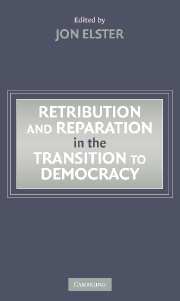PART I - GENERAL ISSUES
Published online by Cambridge University Press: 03 December 2009
Summary
The main topics of the present volume are reparation (restitution and compensation) and retribution (purges and trial) after the transition to democracy. Part I and Part II present case studies of these processes. In Part I, Tyler Cowen and Jon Elster offer more general conceptual discussions of these two phenomena. Cowen draws on and extends earlier writings (notably Waldron 1992) to bring out some of the paradoxes involved in “undoing the past.” Many of these issues turn out to have considerable practical importance, notably when we go from reparations that occur in the immediate aftermath of transition to rectification of historical injustice more generally (see Chapter 14). Elster confronts the practice of retribution in transitional justice with the standard justifications for punishment offered by legal scholars (e.g., von Hirsch 1993). He concludes that the deterrence arguments sometimes offered in defense of severe punishment are defective, and that arguments from desert tend to be indeterminate.
Information
- Type
- Chapter
- Information
- Publisher: Cambridge University PressPrint publication year: 2006
